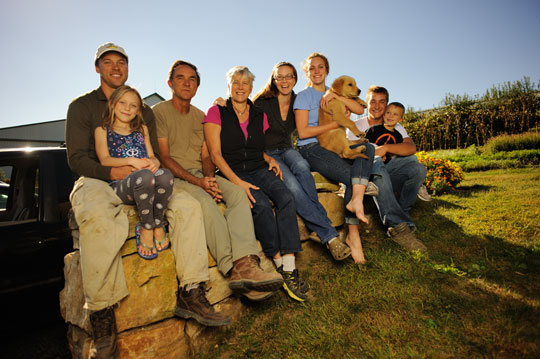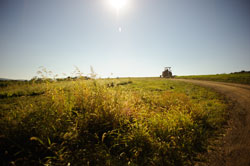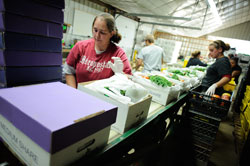 The Brownback Family, owners of Spiral Path FarmSpiral Path Farm is a well-oiled machine. Tidy rows of kale, tomatoes and broccoli line sections of the farm in Loysville, Pennsylvania, and when you see their community supported agriculture (CSA) operation, it’s clear that a considerable amount of planning and organization went into the farming and the business. But it wasn’t always so well-coordinated.
The Brownback Family, owners of Spiral Path FarmSpiral Path Farm is a well-oiled machine. Tidy rows of kale, tomatoes and broccoli line sections of the farm in Loysville, Pennsylvania, and when you see their community supported agriculture (CSA) operation, it’s clear that a considerable amount of planning and organization went into the farming and the business. But it wasn’t always so well-coordinated.
 Though aspiring sustainable farmers now have a wealth of resources at their disposal, Terra and Mike Brownback had to learn on the job. “We both grew up in suburbia,” Terra says.
Though aspiring sustainable farmers now have a wealth of resources at their disposal, Terra and Mike Brownback had to learn on the job. “We both grew up in suburbia,” Terra says.
As an idealistic couple with a vision of living off the land, they wanted “to save the world, [and] to farm environmentally,” so in 1978 they purchased the farm. But they soon found they had little knowledge of how they would actually make that vision a reality. Sustainable agriculture networks, such as the Pennsylvania Association for Sustainable Agriculture (PASA), didn’t exist yet, and though their neighbors were helpful, they didn’t share the Brownbacks’ vision for ecologically balanced farming.
“We got into farming because of our optimism, [but] we got in over our heads,” Mike says. Beyond that, the property’s 1880s farmhouse was run down, it lacked a bathroom, and critters had taken up residence in it. They had their work cut out for them.
“Our parents had a fit,” Terra says, recalling when the couple broke the news to their families. But the Brownbacks were determined. “We had an 11-month old baby, but we had our dreams.”
They started by raising pigs, having had some success raising feeder pigs from 1973 to 1977 at Mike’s grandmother’s small farm in Montgomery county. For the Brownback’s first 15 years as farmers, through the birth of two more sons, Spiral Path Farm practiced conventional livestock agriculture, raising pigs and cultivating 60 acres of cereal crops that included oats, corn, hay and wheat. With this, the Brownbacks felt economically safe, but they had diverged from their original inspiration to become farmers who didn’t use the chemicals that they found themselves dependent on.
In the early ’90s, they started to question themselves. “We were approaching 40 and we’re like, ‘When are we gonna have our dream?’” Terra says, recalling their vision to farm environmentally. They had “knowledge of organic, but no concept of how to pay the bills that way,” Mike adds.
 But even if the kind of agriculture they were practicing didn’t reflect the idealism that inspired them to buy the farm, “We were making a living,” Terra says. “The organic thing felt like jumping off a cliff.” So the couple decided to leave the decision to a coin toss. Heads, they would stay the course. Tails, they would reinvent the farm as an organic produce operation.
But even if the kind of agriculture they were practicing didn’t reflect the idealism that inspired them to buy the farm, “We were making a living,” Terra says. “The organic thing felt like jumping off a cliff.” So the couple decided to leave the decision to a coin toss. Heads, they would stay the course. Tails, they would reinvent the farm as an organic produce operation.
“The coin toss said go,” Mike says.
Their business plan was to get out of the pig business and convert the farm to organic agriculture. They attended a workshop on how to operate a CSA at the second annual conference held by PASA. The couple decided to start with five acres of chemical-free vegetables to support the 22 households in the Harrisburg area that signed up for the farm’s first CSA.
The change has been a good one. For Terra and Mike, 2013 marked their 20th anniversary as a certified organic CSA farm. The barn has been converted into a packing house where employees load vegetables into half- and full-share boxes. Those boxes are sent to 40 pick-up sites in Harrisburg; Silver Spring, Maryland; and Bethesda, Maryland, providing food for more than 2,000 households, according to the Brownbacks.
To an outsider, operations on the farm appear slick and professional, and the Brownbacks are adamant that it’s all the result of the same making-it-work approach to business that led them to farm in the first place.
“A lot of this has been seat-of-the-pants and unbridled optimism,” Mike says. “It’s not about avoiding the catastrophe—it’s about what are you gonna do when it happens … because it happens on a daily basis.”
Spiral Path’s story, like many other entrepreneurial ones, includes days where they wanted to quit, and one in particular. “There’s an unparalleled tragedy in our life—losing our son,” Terra says, referring to their eldest son, Arias, who died in 2001 of a heroin overdose at the age of 24.
“The day he died, I had cabbage I had just planted. It was August 11, hotter than hell, and the cabbage was gonna die because it was so hot,” Mike says. “I had to get pipes in that field and get water on them … I just lost my son. I’m not gonna lose the cabbage, too.”
The needs of the farm forced the Brownbacks to put one foot in front of the other in the face of their grief. “In some ways, the farm has held us together,” Terra says.
Arias is memorialized every year at PASA’s annual Farming for the Future Conference. The Arias M. Brownback Memorial Scholarship Fund, founded in 2001, offers small grants to young farmers to facilitate their attendance at the annual conference, is meant to inspire and support young farmers and help them fulfill their potential.
Today, their sons, Will and Lucas, are taking on the mantle of the farm and the CSA operation. Succession planning to formalize the eventual transfer of the farm is one of the few things that the Brownbacks insist does not align with their “seat-of-the-pants” approach. The family is working to make sure that the transition from their leadership to that of their sons is a smooth one, and with good reason—the farm represents a life’s work of blood, sweat and tears, too.
“We’re getting to the age where we’d both like to have more time to pursue … other pursuits,” Terra says. “And it’s not seat-of-the-pants.”
Story by Emily Teel. Photos by Albert Yee.






